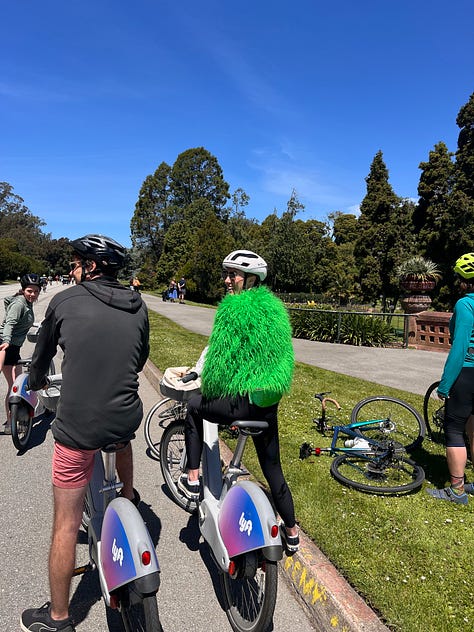Heya friends, happy Friday!
Some thoughts / house-keeping before the news this week:
I forgot to wish readers a happy Eid last week, so I hope that it was a joyous celebration if you celebrate ❤️
Wednesday was Juneteenth here in America. Juneteenth commemorates the day when Union General Gordon Granger arrived in Galveston, Texas, and issued General Order No. 3, emancipating 250k enslaved Black individuals in Texas. America (and many countries) have a long way to go before racial justice is realized; I donated to the NAACP if you’d like to join me.
Last but not least…! I have a friend (Veronika!) who is currently researching cities that are trying to make big urban policy shifts but have their plans go sideways (think NYC having the congestion pricing rug pulled out from under them). She is specifically looking to talk with civil servants based in the UK and Europe, but if you’ve had your own bold plans go awry, I’m sure she’d be open!
If you want to read a great piece about congestion pricing and what went wrong, check out my friend Ali’s newsletter about it!
Alrighty, let’s dive into the news!
California Bill promoting local regulations for AVs scrapped
Filed under: disheartening. Autonomous vehicles are (in theory) intended to help cities achieve their transportation goals (reduce crashes, improve congestion, decrease VMT and GHG emissions, etc). So when cities want to regulate how this new technology is introduced so that they actually achieve these goals, what do the companies do? Whine and throw millions of dollars into lobbying efforts to get the bill scrapped. You’d think maybe somebody at the leadership level would question why cities aren’t rolling out the welcome mat for AVs, but instead they look at their sunk costs and steam roll right on through.
I’m frustrated. Frustrated that solutions that we know will work to save lives (as simple as the radius of a street curb, speed limits, and smaller street widths) can’t be prioritized. Frustrated that companies with a vested interest in warfare say their solution can’t scale if they operate on a city-by-city basis… even though cities are their most important stakeholders (and spend their venture capital funny money selling an idealized version of transportation to the public). I am tired of the smoke and mirrors that is AV companies promising to solve urban problems when their bottom lines and shareholder earnings are the only thing that seem to be driving their decision making. End rant (for now… lol).
Edinburgh bans SUV advertisements
Edinburgh is joining a small legion of cities banning advertisements for SUVs on city-owned property. The ban applies to fossil-fuel related products more broadly—including oil companies, car manufacturers, airlines, ships, and arms dealers. Both Amsterdam and Sydney have enacted similar bans. The article compares these bans to tobacco bans, and discusses how effective and ineffective this can be in changing individual behaviours.
Austria plans to confiscate cars from “super speeders”
“A new law in Austria allows authorities to confiscate the vehicles of those who exceed posted speed limits by large margins, even after a single offense.” The government can even sell their vehicles! While I have not heard of this policy before, officials said they drew inspiration from Switzerland, which has been confiscating cars owned by extreme speeders for more than a decade (!!).
America’s growing commute time
The pandemic has shifted much about our commuting patterns in America. Specifically, the percent of people who are “super-commuting” (travelling 75 miles or longer) is up by a third from pre-pandemic levels. As a share of all commutes, 18.5% are now 40 miles or longer, up from 15.8% before the pandemic.
The thinking is that people who are “hybrid” workers who only need to go into an office 1-2 days a week will stomach a much longer commute than if they had to make that trip daily.
Waabi—a Toronto-based autonomous trucking company from an ex-Uber leader—says they will launch their trucking service as early as next year. Waabi uses simulations to teach their fleet, as opposed to collecting data by driving millions of miles on public roads. Last month, Waabi signed a multi-year lease on a warehouse in Dallas, so we should keep our eyes peeled for more news from the lone star state.
Are AVs safer than human drivers?
New research from the University of Florida (link here) about how autonomous vehicle safety compares to human drivers, made the media rounds this week. Here’s an official quote from the research abstract:
“The analysis suggests that accidents [sic] of vehicles equipped with Advanced Driving Systems generally have a lower chance of occurring than Human-Driven Vehicles in most of the similar accident scenarios. However, accidents [sic] involving Advanced Driving Systems occur more frequently than Human-Driven Vehicle accidents under dawn/dusk or turning conditions, which is 5.25 and 1.98 times higher, respectively.“
How you know this study was not conducted by people with a backgorund in transportation planning? They use the word “accident” to describe a collision.






A friend and I made this preserved lemon pappardelle with pine nuts, feta, and mint (+ courgette) on Sunday and it was so. good. You should absolutely give it a go.
I am currently reading Ladyparts by Deborah Copaken (who also writes a substack under the same name), and it is a brutal memoir about women’s bodies and life and everything falling apart in a country without basic healthcare. It is very well written if you enjoy sarcasm and wit (and based on you reading my newsletter… I’m assuming that’s a yup).
That’s all from me. Have a beautiful weekend friends.
Sarah
If you’d like to support my work and this newsletter, please consider becoming a member of the San Francisco Bicycle Coalition or making a donation.








AVs decreasing VMT, that is so funny. How does that even happen unless the next "fare" is right where the last one was dropped off, 'cause that's likely!
At least there is some hope with bans on ads and taking cars away from speeders that shouldn't have had them in the first place. Too bad Austria has the violation speeds so high, and that the person has to be caught by an officer (meaning a second vehicle driving at ridiculous speeds), instead of speed cameras.
Hybrid workers making a trade-off of long commutes? More likely they moved further away during the pandemic and now can't afford to get closer to the office.
Collision is worse than accident. But I so wish everyone would just use "crash" instead.